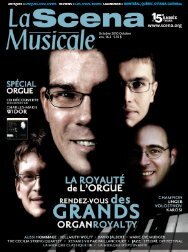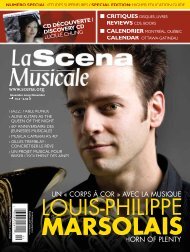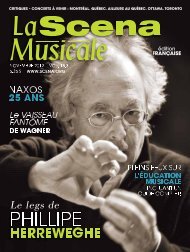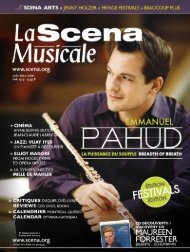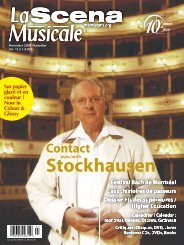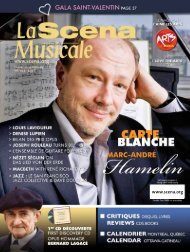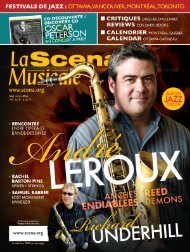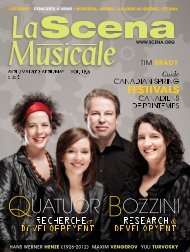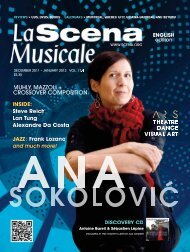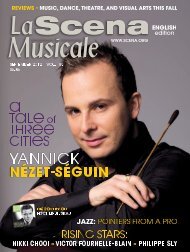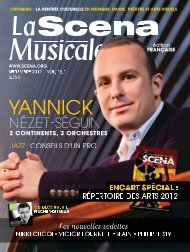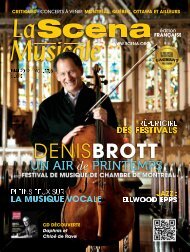Download - La Scena Musicale
Download - La Scena Musicale
Download - La Scena Musicale
Create successful ePaper yourself
Turn your PDF publications into a flip-book with our unique Google optimized e-Paper software.
MUSICIAN’S CORNER<br />
Music and Kids:<br />
A Natural Pair<br />
SALIMAH SHIVJI<br />
Plato once said, "Music training is a more<br />
potent instrument than any other,<br />
because rhythm and harmony find their<br />
way into the inward places of the soul."<br />
Taking their cue from Plato are the many parents<br />
who enroll their young children in music lessons<br />
with the hope that this education will<br />
greatly benefit them in future years. The positive<br />
aspects of studying music have been researched<br />
extensively over the last decade: it improves selfesteem,<br />
promotes creativity and discipline and,<br />
essentially, makes people feel good.<br />
“I know my sons have huge amounts of fun and<br />
a great social life. They're learning a universal language<br />
beyond words,” says Ros Asquith, mother<br />
of two boys who study music.<br />
The publication of the widely popular and<br />
equally controversial study “Music and Spatial<br />
Task Performance” is, in part, responsible for<br />
promoting the idea that music has positive<br />
effects on kids. Since 1993, when Nature published<br />
the study, labeled the “Mozart Effect” by<br />
the media, the public has been scrambling to<br />
push classical music on children.<br />
The study found that college students performed<br />
better at spatial-reasoning tests after listening<br />
to Mozart’s Sonata for Two Pianos in D<br />
Major for 10 minutes. The Mozart Effect quickly<br />
gained mass acceptance, seducing adults<br />
around the world and sparking a renewal of<br />
interest in classical music, especially among parents<br />
who were led to believe that Mozart could<br />
make a big difference in their children’s lives.<br />
Dean Jobin-Bevans, former director of the<br />
McGill Conservatory, has seen many parents<br />
arrive at the institution with this idea in mind.<br />
“I don’t think it’s all malarkey, but personally, I<br />
don’t subscribe to it,” said Jobin-Bevans.<br />
Instead, he prefers to concentrate on the other<br />
rewards of music, because, as he points out,<br />
“there’s much more to it.”<br />
Further experiments testing music and the<br />
brain failed to reproduce the results of the<br />
1993 study. Other scientists have also<br />
expressed doubt over the fact that listening to<br />
Mozart makes kids smarter.<br />
Despite the controversy over scientific proof,<br />
many music teachers are certain that music is<br />
good for children, regardless of whether it<br />
affects their intelligence.<br />
“Music is an entirely different discipline,”<br />
says Jobin-Bevans. “If studying a solo instrument,<br />
the student has to learn to practice in a<br />
disciplined way. It’s about learning to focus.”<br />
Playing in ensembles helps children develop<br />
vital skills such as teamwork, where they are<br />
taught to give up their own desires in the interest<br />
of the group.<br />
Music is also an instinctive part of a baby’s<br />
early development, claims “Smarter Than The<br />
Rest Of Us,” a recent documentary on CTV’s W5<br />
that revisits how sound and music affect babies.<br />
Citing the historical and cross-cultural tradition<br />
of mothers and guardians singing to children<br />
in order to soothe them, the program,<br />
written and directed by Robert Duncan, goes<br />
on to prove that music is a positive influence.<br />
Babies are very receptive to melodies, according<br />
to Dr. <strong>La</strong>urel Trainor, a professor of psychology,<br />
neuroscience and behaviour at McMaster<br />
University. In her study of perception of sound in<br />
infants, she found that people who were happy<br />
prior to performing the spatial task test achieved<br />
better results. She believes that these results are<br />
not specifically related to Mozart and could be<br />
influenced by any kind of music.<br />
However, the benefits of music, particularly<br />
at a young age, are tangible. Music affects<br />
memory and brain development. Kids who follow<br />
the Suzuki method, which likens music<br />
instruction to language acquisition and insists<br />
on children starting young, are usually ahead of<br />
their school classmates. They excel in pre-reading<br />
skills such as matching, rhyming, motor<br />
skills and language.<br />
Many schools and private teachers around<br />
the world have adopted the Suzuki method,<br />
despite the criticism that it produces imitators<br />
who play by ear and do not learn how to read<br />
music properly. “Music becomes a part of your<br />
life and children get the value of learning a certain<br />
instrument through this largely successful<br />
approach,” says Jobin-Bevans, whose former<br />
school offers courses based on the Suzuki style.<br />
Other institutions take a slightly different<br />
course, but also show signs that the benefits of<br />
music are at the forefront of new methods of<br />
teaching. The Royal Conservatory of Music,<br />
Canada’s oldest independent arts educator,<br />
developed Learning Through the Arts in 1995.<br />
The program, which teaches history, math and<br />
social studies through songwriting, dance and<br />
visual art, has grown exponentially in the last<br />
ten years. There are now 100,000 students<br />
taking part in 300 schools across the country.<br />
Promotion of social and emotional development<br />
through music and the arts, which may in<br />
turn lead to academic improvement, is the order<br />
of the day in this experimental program. Its creators<br />
believe that music helps with memory and<br />
focus. The emphasis is on advancing communication,<br />
which aligns with the broader benefits of<br />
music for young children: better self-expression,<br />
teamwork skills, and discipline.<br />
Programs like these indicate that the philosophy<br />
of music instruction and its perceived<br />
benefits continue to grow with time. Whether<br />
children learn to play the piano or the violin, listen<br />
to Mozart or Mendelssohn, they will be better<br />
equipped to deal with social situations as they<br />
get older. Clearly, music is always in good order<br />
when it comes to kids. p<br />
5 concrete benefits of music lessons<br />
•Teaches the importance of perseverance<br />
and hard work to perfect a performance.<br />
• Improves teamwork skills and discipline.<br />
•Promotes creative thinking and the search<br />
for alternate solutions to problems that<br />
may arise.<br />
• Gives children a concrete means of selfexpression<br />
and improves self-esteem.<br />
• Helps conquer fear and builds<br />
confidence.<br />
For more information and details on other<br />
advantages, visit the Music Education<br />
Online website at<br />
www.childrensmusicworkshop.com<br />
10 Fall 2005



